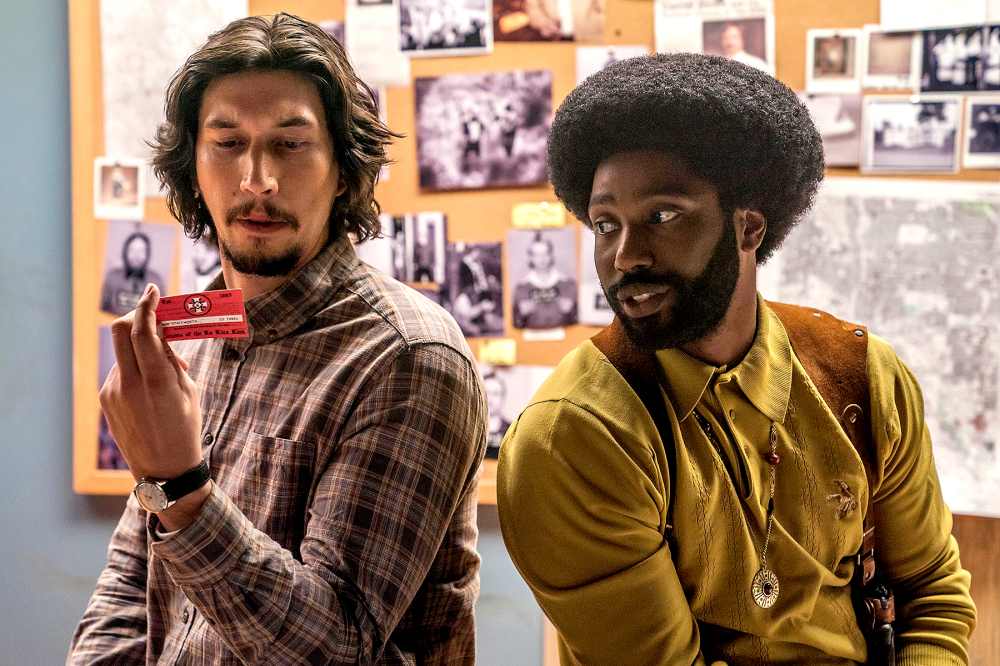3 stars (out of 4)
I don’t like typing the title of BlacKkKlansman. It just looks wrong, aesthetically. I’m fighting the urge to rip it apart and alter it to a more refined Black Klansman. But director Spike Lee isn’t interested in making me feel comfortable. On any level. At his most urgent, he likes to challenge and force contemporary Americans to study their reflections in the mirror and examine the image staring back. Do The Right Thing. Malcolm X. Jungle Fever. She’s Gotta Have It. 25th Hour. Words on a screen are no exception.
His latest outing is both super-fly and super-flawed. When I wasn’t engrossed and hanging on the words of the main characters, I was mentally re-editing it in my head. Twenty minutes could be cut, easy. Lee alters the film’s pulse by the minute, veering from impassioned anger to witty repartee, and the constant change feels like a massive head rush. See it anyway. If nothing else, the premise is outlandish to the point of fiction. It is, in fact, based on fact. Or, as Lee puts it in a way that only he can in the intro, “some fo’ real fo’ real sh-t.” There’s even a 2014 memoir to back to it up. Its title: Black Klansman.
It’s the 1970s in Colorado Springs, Colorado. An admitted straight-arrow named Ron Stallworth (John David Washington, son of one Denzel Washington) becomes the first African-American to join the local police department. Determined to forge a name for himself, the rookie sets out to expose the local branch of the Ku Klux Klan. He gets as far as a phone call to the local president (Ryan Eggold), who invites him to an informal meet and greet. Stallworth can’t appear undercover with the KKK, of course. Solution: Recruit a veteran officer named Flip Zimmerman (Adam Driver) to be the face of the operation. Flip is Jewish, only half-acknowledging it. Together, they infiltrate. In a lesser director’s hands, this pairing would be the catalyst of an awkward interracial buddy comedy.

In BlacKkKlansman, it’s an entertaining and fascinating bad-ass union in the truest sense. Ron and Flip create an unlikely hybrid of an identity who looks like Flip but sounds like Ron. (Washington shifts his voice to “sound white” when talking on the phone, not dissimilar to what LaKeith Stanfield does as a telemarketer in Sorry to Bother You.) The result is a “Ron Stallworth” who’s white, African-American, Jewish, with a moral compass masquerading as a civilian Klan supporter. Lee does a masterful job illustrating the bond between two oppressed groups in the eye of the oppressor.
Both characters are heroes — Washington’s Ron goes so far as to strike up a peculiar friendship with Klan leader David Duke (Topher Grace). It’s Driver who gives the meatier performance, capped by one indelibly soulful monologue. He never had a Bar Mitzvah and wasn’t raised culturally Jewish, he tells Washington. But now that a few suspicious Klan members have subjected him to unsettling questions about his Jewish identity, “I think about it all the time.”
Washington is more of a blank slate. His low-energy character scarcely changes from the time he interviews for the police job to the delirious scene in which he finally comes clean about his identity. The Klansmen, meanwhile, are portrayed as dumb red necks, perhaps dangerously so. Much of the film’s relaxed humor is derived from their cluelessness. (One character, for example, mispronounces the word “circumcision.”) Even the female president of the Black Student Union (Laura Harrier) that befriends Ron at a rally is undercooked, popping up only to lecture her new ally.
Though BlacKkKlansman is set in era when men and women wore Afros and discussed the merits of 70s Blaxploitation films such as Shaft and Foxy Brown, this is unmistakably a 2018 picture show. Some of the nods to present-day politics, such as David Duke’s opinions on his ideal White House administration, are winking and slight. Lee gets more heavy-handed during the final four minutes, when he shows clips of the 2017 violent Charlottesville, Virginia, rallies and wincing Donald Trump soundbites. No doubt America is having a moment. But in this context, Lee’s decision to underline constant parallels distracts from the incredible narrative unfolding between Flip and Ron in Colorado Springs.
Still. Lee is the kind of filmmaker that empowers Americans to stand up for change. Talking isn’t enough; you must get up, he implores, and do the right thing.
BlacKkKlansman opens in theaters Friday, August 10


